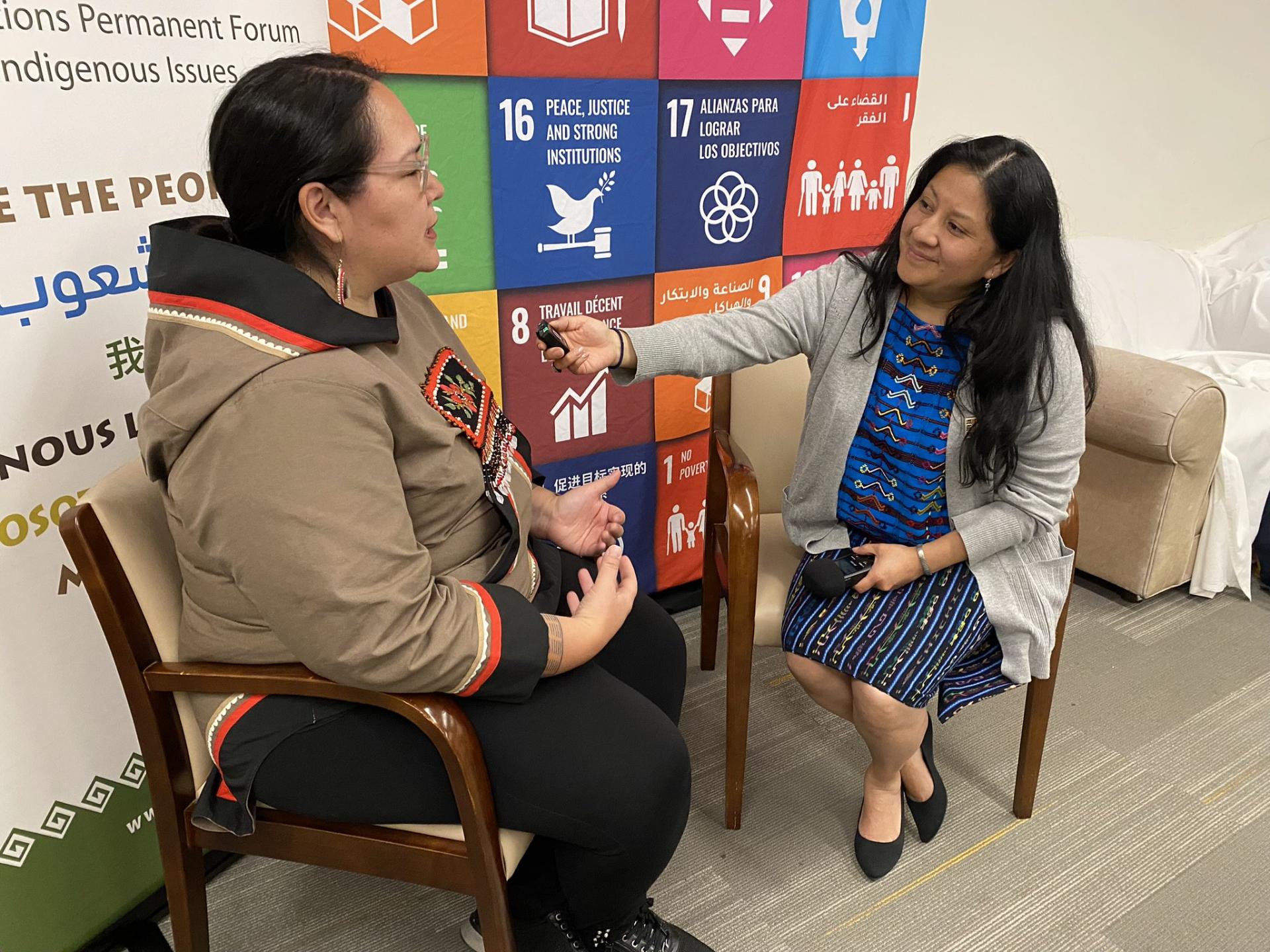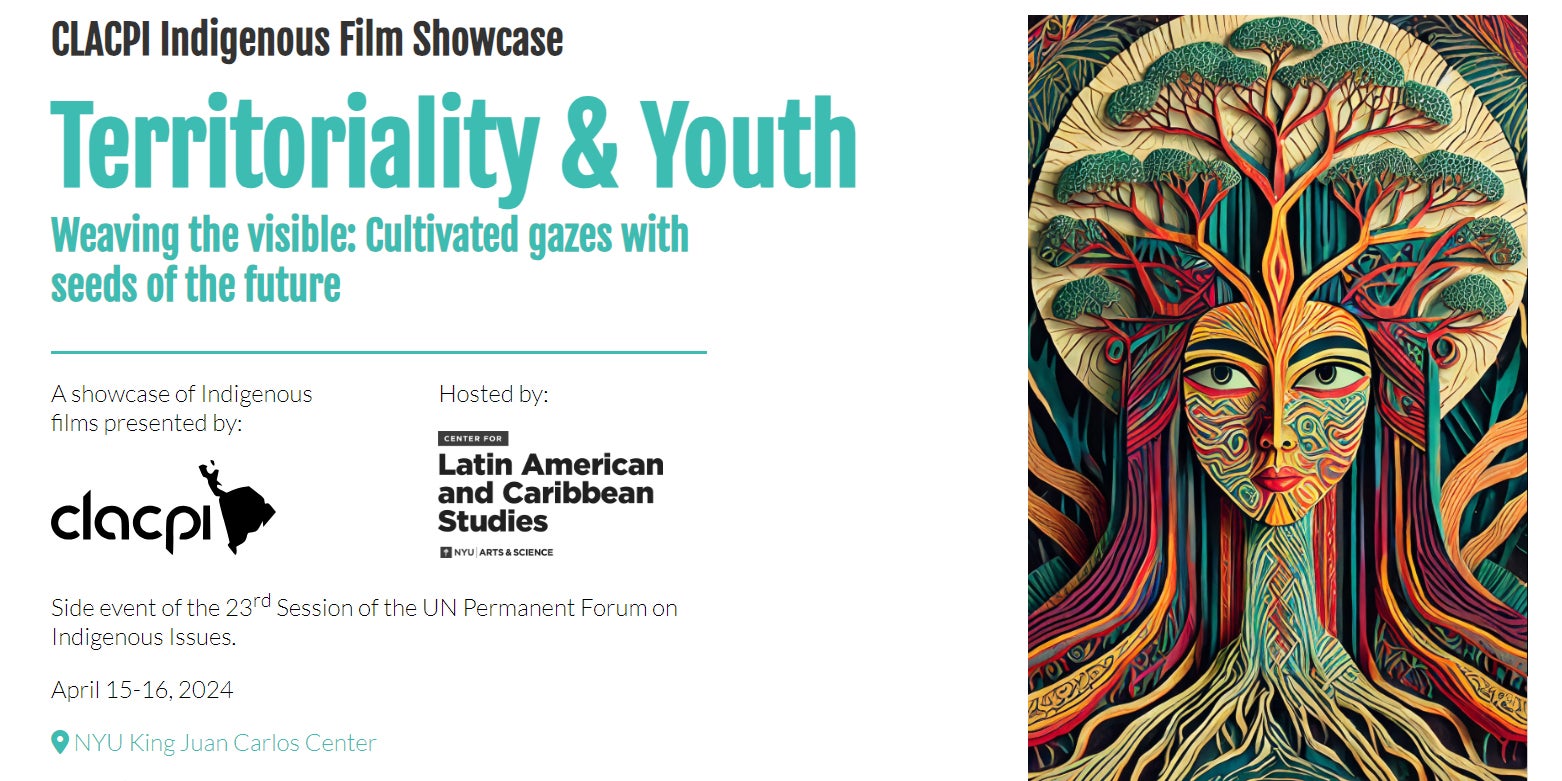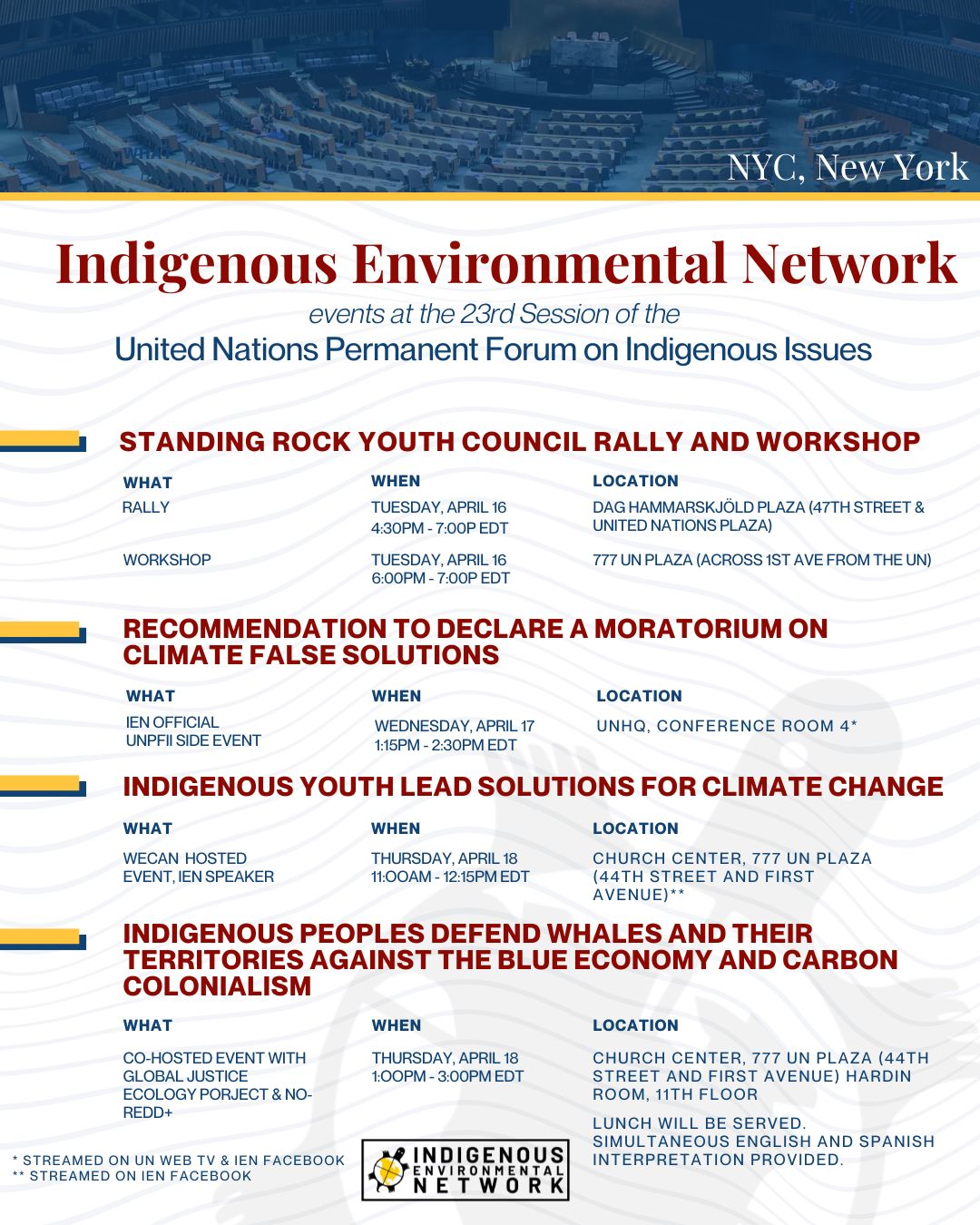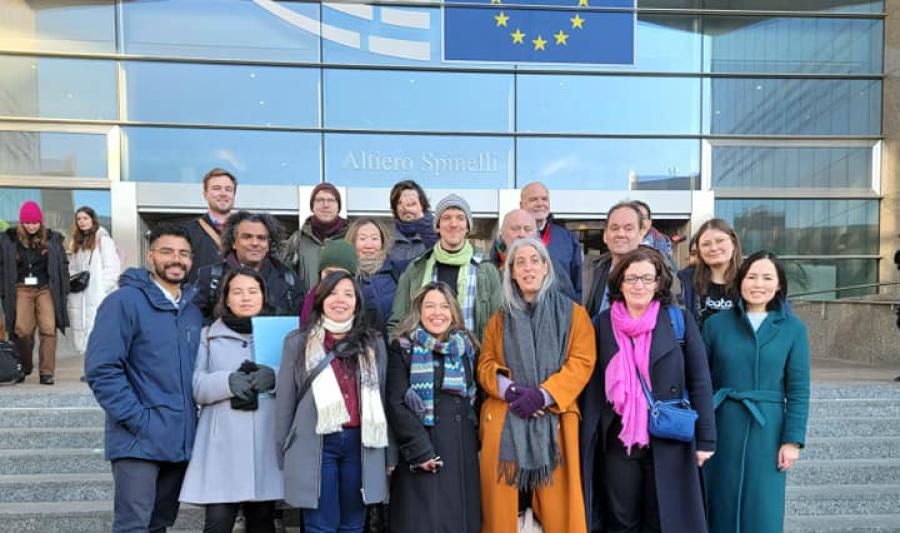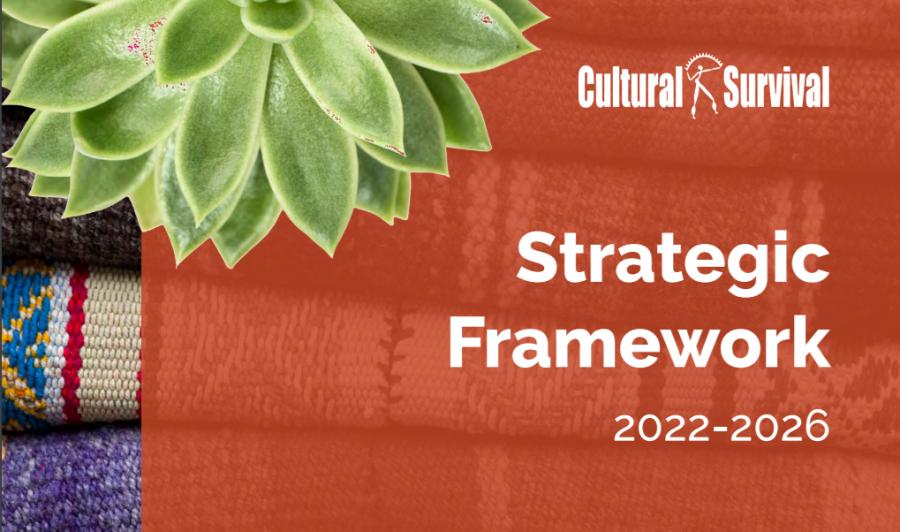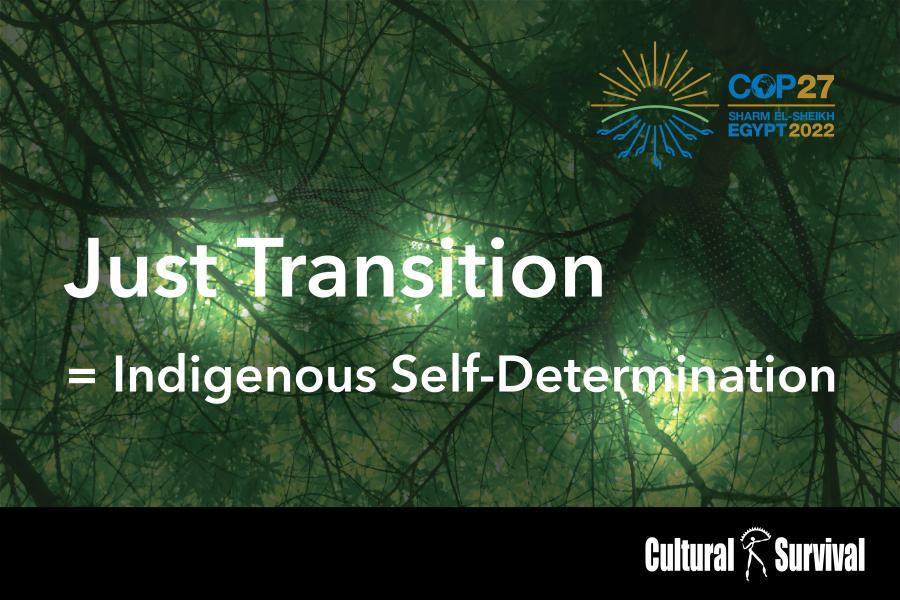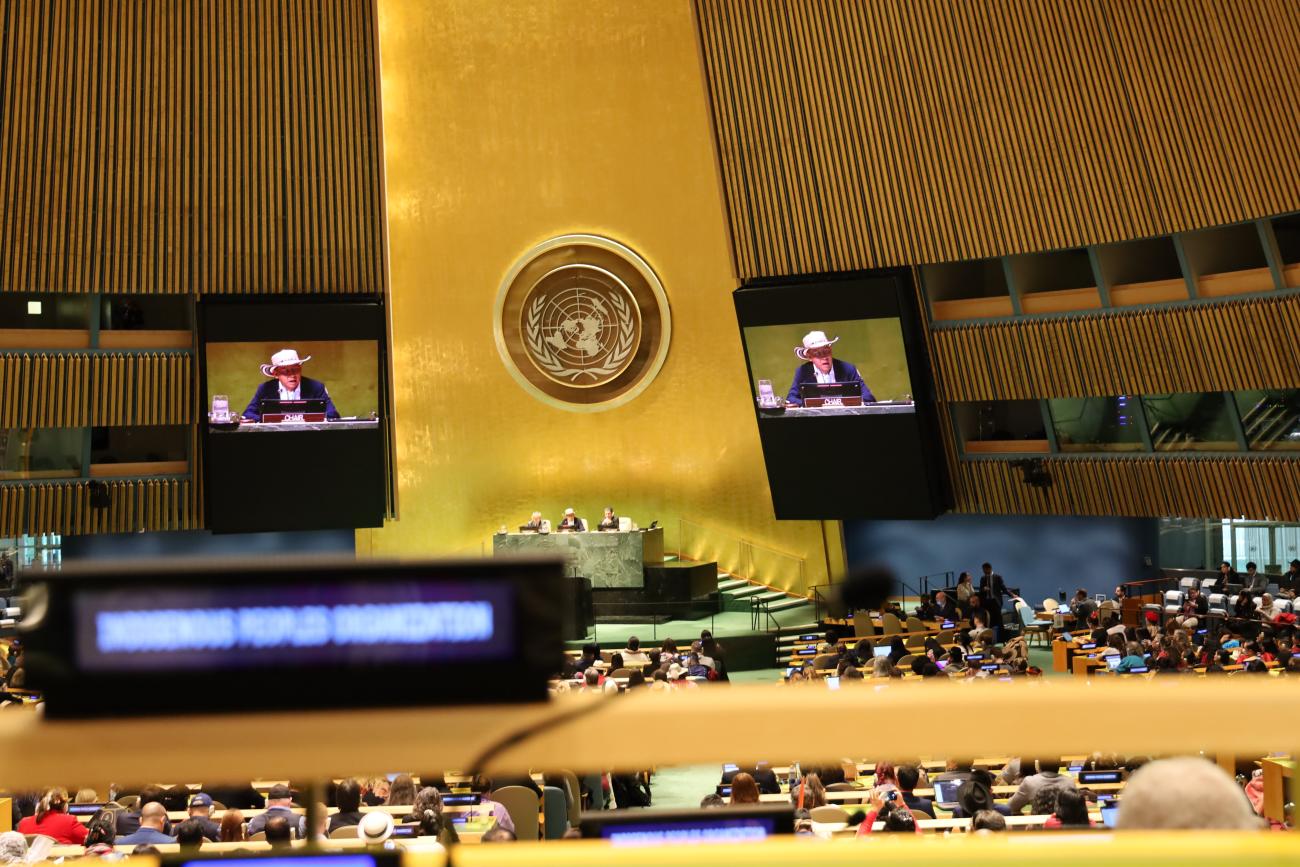
On April 15-26, 2024, the 23rd session of the United Nations Permanent Forum on Indigenous Issues (UNPFII) will take place at the UN Headquarters in New York. This year’s session theme will focus on "Enhancing Indigenous Peoples’ right to self-determination in the context of the United Nations Declaration on the Rights of Indigenous Peoples: emphasizing the voices of Indigenous youth.”
After decades of Indigenous leaders pushing for inclusion and representation at the United Nations, on July 28, 2000, the UNPFII was established as a high-level advisory body to the UN Economic and Social Council by resolution 2000/22. Since 2002, the UNPFII has been meeting annually.
The UNPFII can be utilized by Indigenous Peoples to raise awareness, bring policy change to other UN bodies, and influence how Indigenous rights are implemented at the local and national levels. Over the past 23 years, the UNPFII has coordinated and commissioned over 64 studies and reports and 60 publications. Members of the Forum have worked on drafting policies for UN agencies and have made recommendations to other UN bodies.
Some of the greatest achievements over the past two decades have been the networking and alliances built among Indigenous delegates and representatives from all over the world. The relationships, partnerships, and friendships built are core to the global Indigenous rights movement. Aside from the official talks, interventions, panels, official side events, and parallel events, what really also needs to be elevated are the side conversations in the hallways between delegations, UN agencies, funders, and State representatives. This is where true change happens.
Check out some key highlights from DOCIP.
Join us in amplifying Indigenous Peoples' voices this year at UNPFII with a series of events and opportunities below.
1. Join the conversation!
What are the pressing issues affecting your Indigenous community?
Create a short video (up to 2 minutes) and post it on Instagram, Threads, X/Twitter, and Facebook using #UNPFII23 #WeAreIndigenous #Proud2BIndigenous.
Share your photos from this year's and the past UNPFIIs using the same hashtags.
2. Watch the Livestream of the UNPFII.
Opening ceremony of the Forum will be streamed at webtv.un.org.
Monday, April 15, 2024 11:00am.
3. Attend a UNPFII side event.
The full list of side events will be posted here.
Join Cultural Survival at these events below:
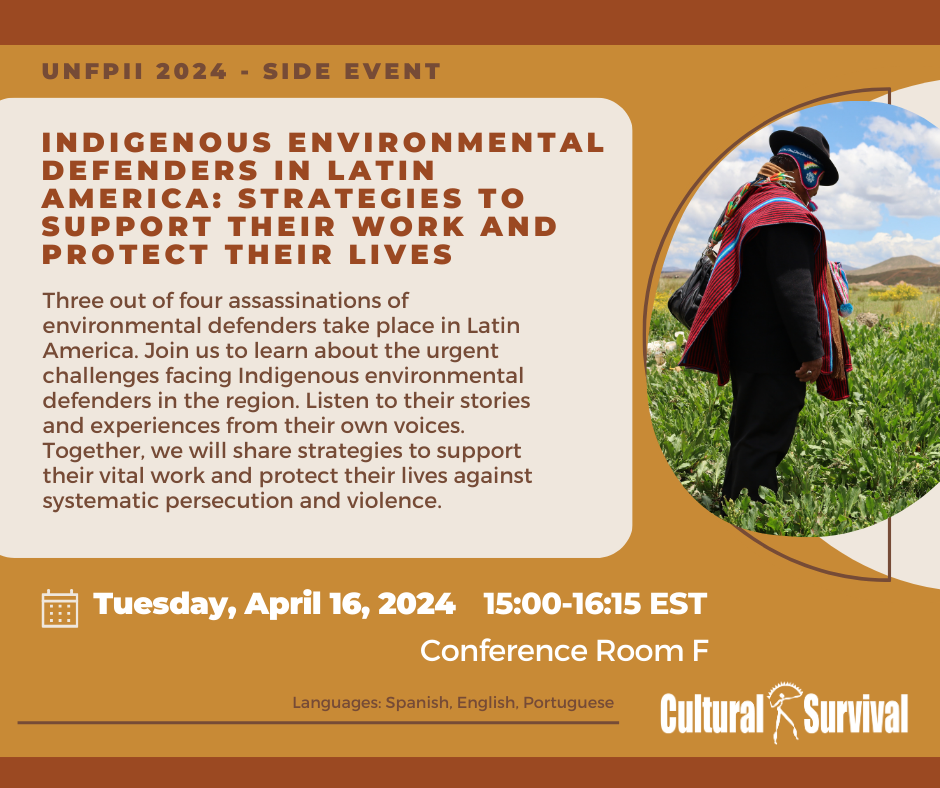
Indigenous Environmental Defenders in Latin America: Strategies to Support their Work and Protect Their Lives
Tuesday, April 16, 2024, 3:00-4:30 pm ET
Conference Room F. United Nations Headquarters, 405 East 42nd Street, New York, NY, 10017; entry requires United Nations ground passes.
Latin America is one of the most dangerous regions to be an Indigenous rights and environmental defender. Three out of four assassinations of environmental defenders take place in Latin America. Indigenous defenders face a double threat: defending rights and being Indigenous. According to a Global Witness 2022 report, almost 40 percent of murdered environmental defenders were Indigenous, a disproportionately high figure given that Indigenous Peoples comprise roughly 6 percent of the global population. Cultural Survival’s non comprehensive data shows 77 Indigenous defenders were murdered only in 2023. These figures prove a systematic persecution is taking place against Indigenous defenders as a result of their land defense in opposition to mega projects, infrastructure development, mining, and other projects undertaken without their Free, Prior and Informed Consent. At this session we will bring the stories of murdered Indigenous Environmental Defenders to the front and will share strategies to support their work and protect their lives.
Sponsored by Cultural Survival.

Beyond Resources: Indigenous Women’s Rights and Resilience in the Green Economy
Tuesday, April 16, 2024, 3:00-4:30 pm ET - REGISTRATION
Conference Room 5, United Nations Headquarters, 405 East 42nd Street, New York, NY, 10017; entry requires United Nations ground passes.
This United Nations Permanent Forum on Indigenous Issues side event explores the intersectionality of gender, Indigenous Peoples’ rights, and the green economy, with a specific focus on the experiences of Indigenous women in the context of extractive industries. The event aims to shed light on the unique challenges faced by Indigenous women, amplify their voices, explore pathways for empowering Indigenous women in sustainable development, and uphold their individual and collective rights.
CO-SPONSORS: First Peoples Worldwide, Securing Indigenous Peoples’ Rights in the Green Economy (SIRGE) Coalition, International Forum of Indigenous Women (FIMI), and Continental Network of Indigenous Women (ECMIA), Cultural Survival
This is an in-person event; registration is required by completing this form. Registrants will be accepted up to start of the event.
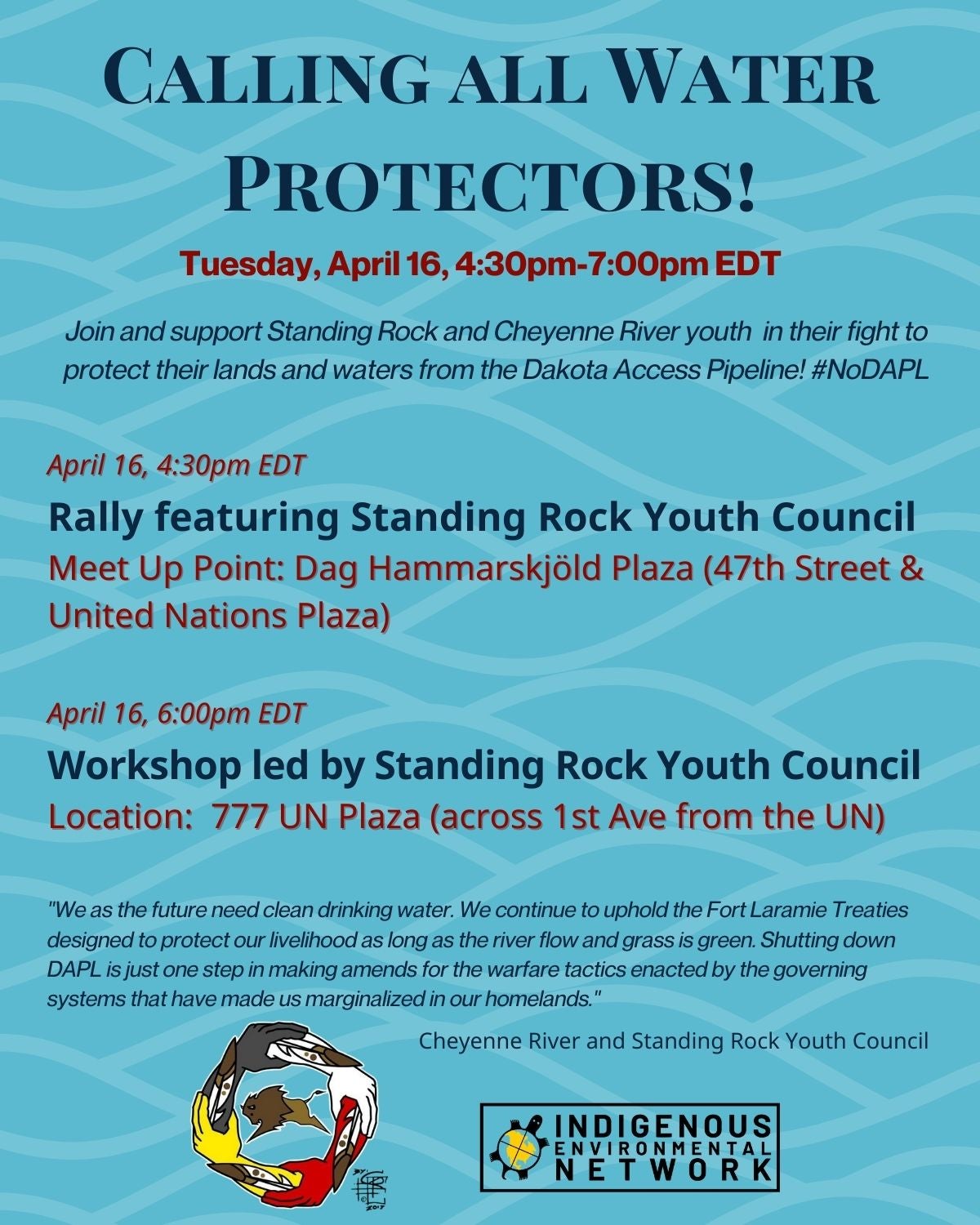
‘Share Your Story’
Thursday, April 18, 2024, 3:00-4:15 pm ET
Conference Room 11, United Nations Headquarters, 405 East 42nd Street, New York, NY, 10017; entry requires United Nations ground passes.
Indigenous Journalist Association and Grist will co-host an official UNPFII “Share Your Story” side event. The side event will provide a crash-course in honing messages, focusing communications, and working with reporters and serve as a primer for participants attending a day-long training on Saturday, April 20.
For questions, please contact fcompton@naja.com.
3. Follow Discussions from the Indigenous Media Zone.
The Secretariat of the Permanent Forum (SPFII) and the Department of Global Communications (DGC), in partnership with Cultural Survival, is organizing an Indigenous Media Zone during the 23rd session of the Permanent Forum in 2024. This will allow Indigenous media, journalists and platforms an opportunity to report on the session through Indigenous worldviews, perspectives and languages and organize media events around the theme of the session - “Enhancing Indigenous Peoples’ right to self-determination in the context of the United Nations Declaration on the Rights of Indigenous Peoples: emphasizing the voices of Indigenous youth”. Non-indigenous media are also welcome to join the Indigenous Media Zone. Further, in line with the International Decade on Indigenous Languages, the Indigenous Media Zone will aim to encourage the participation of Indigenous media practitioners in a wide variety of Indigenous languages from different regions. Several panels and interviews will be livestreamed on facebook.com/culturalsurvival.
The Indigenous Media Zone will be located in the UN Correspondents Association Room (3rd floor, Secretariat building, S-310) from Monday to Friday, April 15-19, 2024, 9:00 am to 6:00 pm EST.
Check out some planned panels at the Indigenous Media Zone:
Monday, April 15, 2024 3:00-4:00 pm ET
Indigenous Peoples and the Energy Transition: Supporting Strategies For Self-Determination in the Face of a New Wave of Extractivism
Organizer: Securing Indigenous Peoples Rights in the Green Economy (SIRGE) Coalition
Tuesday, April 16, 2024 1:00-2:00 pm ET
Indigenous Youth Leaders Defending and Promote Indigenous Peoples' Rights, Lands, Languages, and Worldviews
Organizer: Cultural Survival
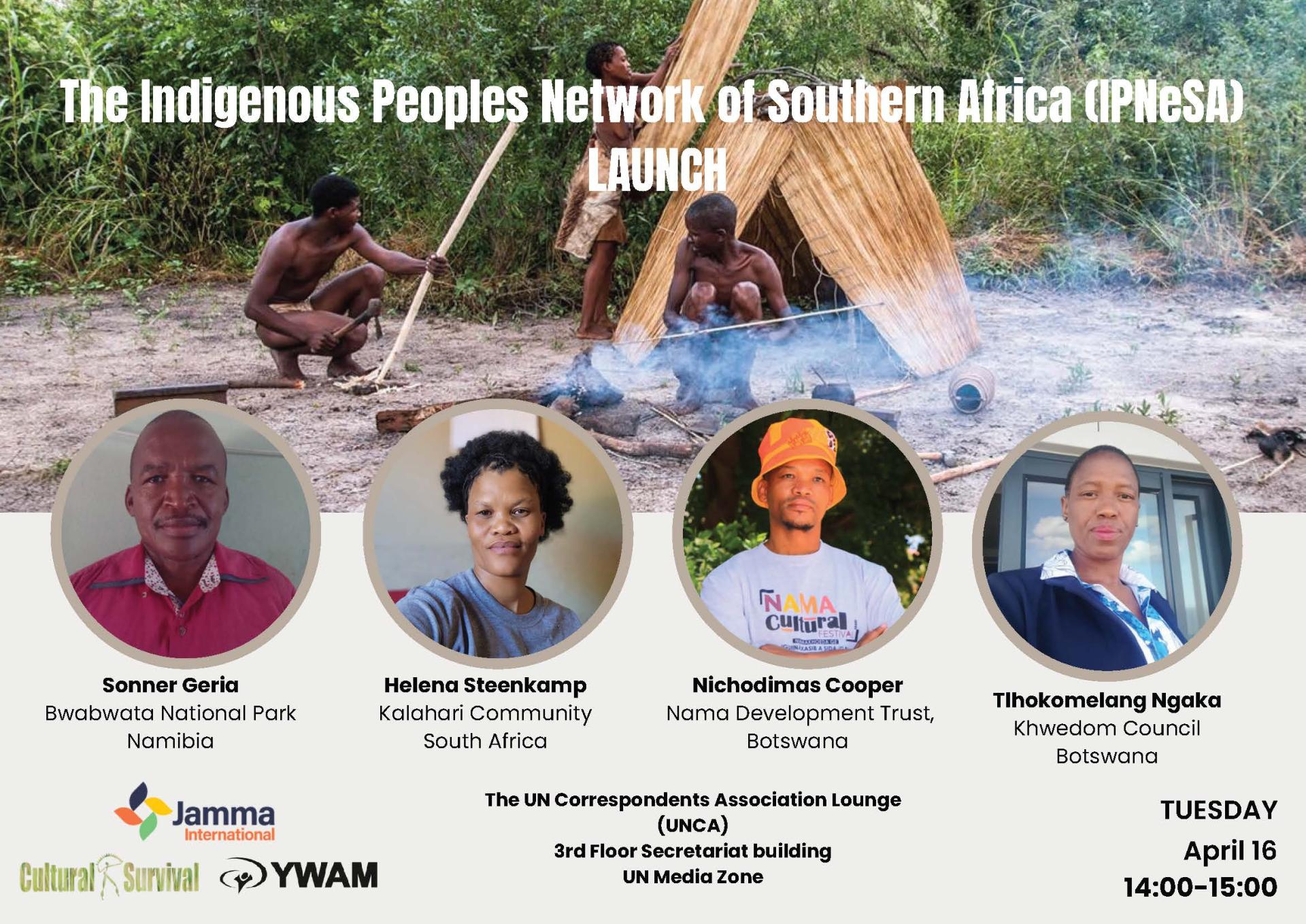
Wednesday, April 17, 2024 2:00-3:00 pm ET
Medios de comunicación comunitaria Indígenas y el derecho a la libertad de expresión
Organizer: Cultural Survival
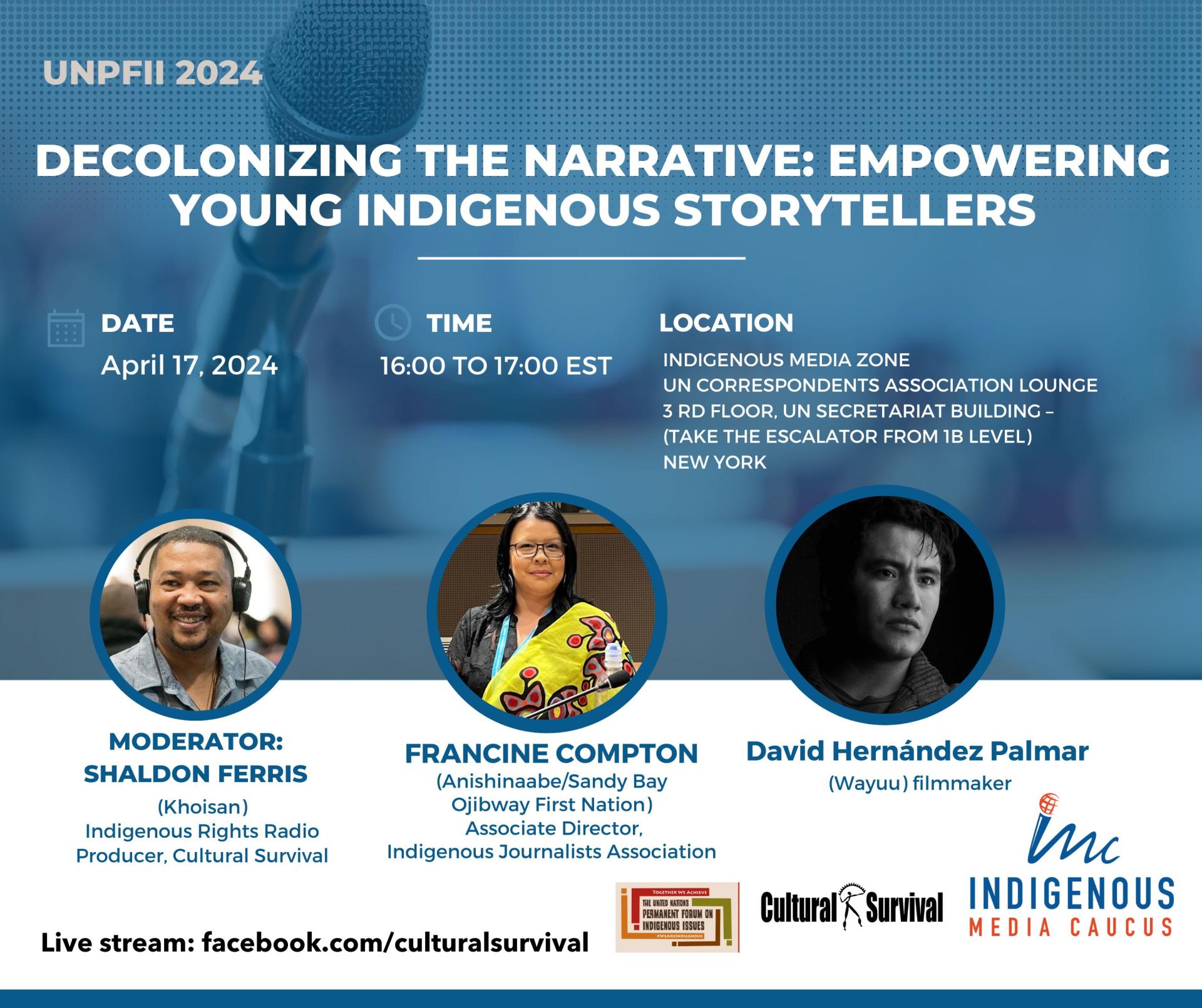
4. Attend a Parallel Event
Indigenous-led alternatives to state-led conservation
Tuesday, April 16, 2024 2:00 - 5:00 pm
Church Center(10th floor conference room)
777 United Nations Plaza, New York, NY 10017
The side event is a panel on Indigenous Ecological Areas – understood as territories led by Indigenous communities as alternatives to state-led and international top-down conservation models. and with a commitment to: i/ resist extractive capital, monoculture farming and destructive state projects ii/ proliferate biodiversity and work towards ecological balance in forests and waterways iii/ promote the rights and knowledge of Indigenous lifeways and spiritual understanding of ecology iv/ reject exclusionary conservation models. It has been shown over and over again that Indigenous territories have the highest rates of biodiversity and lowest rates of deforestation, yet in practice there is very little support for Indigenous-led ecological territories and in most contexts legal frameworks are seriously lacking. Presenters on this panel have been leaders in developing and promoting Indigenous Ecological Areas.
Organizers: Shipibo Conibo Center and Tribal Link

Shareholder Advocacy Leadership Training (SALT) Workshop: Protecting Lands, Resources and Indigenous Peoples’ Rights
Thursday, April 18, 9:00 am-1:00 pm ET - REGISTER
Salvation Army International Social Justice Commission, 221 East 52nd Street New York, New York 10022.
This Shareholder Advocacy Leadership Training (SALT) workshop offers practical tools for Indigenous leaders and advocates to pursue shareholder advocacy strategies to protect their communities, resources, sacred places, and cultural practices. Participants will learn how to mobilize strategies to target companies proposing harmful projects, examine case studies that make the business case for Indigenous Peoples’ rights, and hear directly from Indigenous and investor leadership with a proven track record of creating positive outcomes through corporate engagement.
Learn more about shareholder advocacy at https://www.colorado.edu/
Organizer: First Peoples Worldwide
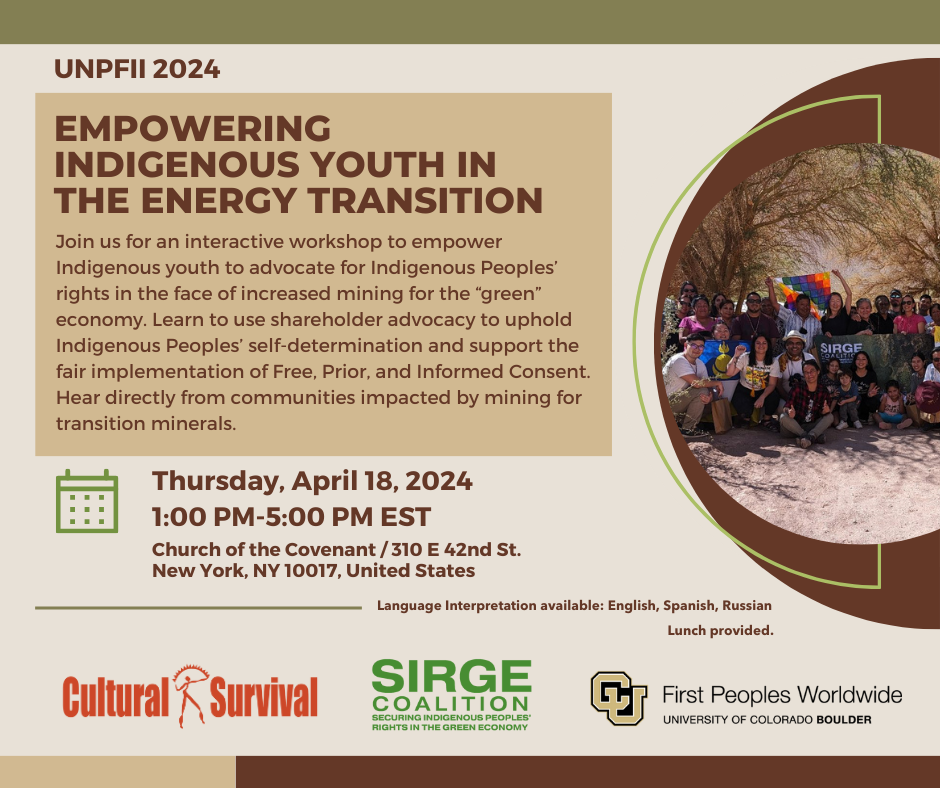
Empowering Indigenous Youth in the Energy Transition
Thursday, April 18, 2024
Lunch provided 12:45 PM
Workshop: 1:00 PM - 5:00 PM
Languages: English, Spanish, Russian
Church of the Covenant 310 E 42nd St, New York, NY 10017, United States
Register by emailing Bryan Bixcul at bryan.bixcul@cs.org
The move to a low-carbon economy has been center stage for both government and business for more than a decade. As efforts to address climate change have prompted a switch from fossil fuels to “clean” energy, the demand for transition minerals used in electric vehicles, such as lithium, cobalt, copper, zinc, and nickel, has increased exponentially. While a shift in energy consumption is critical to mitigating climate change, the impact of the increased mining for these resources without Indigenous Peoples’ Free, Prior and Informed Consent poses the same threats to Indigenous Peoples’ rights, livelihoods, and territories as the fossil fuel economy.
This workshop aims to provide Indigenous youth attending the 23rd session of the UN Permanent Forum on Indigenous Issues (UNPFII) with a toolkit of legal, shareholder, and market strategies to advocate for the rights of Indigenous Peoples facing extractive industries, especially in the context of extraction for Transition Minerals. Together, we will specifically address the right to Free, Prior and Informed Consent and its implementation as a key safeguard for Indigenous Peoples’ right to self determination. During the workshop we will hear from community representatives directly threatened or affected by extractive industries.
CO-SPONSORS: Cultural Survival, First Peoples Worldwide, Securing Indigenous Peoples’ Rights in the Green Economy (SIRGE) Coalition

IJA hosts ‘Share Your Story’ training for UNPFII attendees
Saturday, April 20, 2024 10am - 5pm ET
American Indian Community House
275 Madison Ave., New York, NY
The Indigenous Journalists Association (IJA), Grist, and CCUNESCO will host the ‘Share Your Story: Communicate Effectively with Journalists’ training to participants of the 23rd Session of the United Nations Permanent Forum on Indigenous Issues (UNPFII) on Saturday, April 20 at the American Indian Community House, 275 Madison Ave., from 10 am - 5 pm ET.
The training is limited to 20 participants. Registration is required and closes Thursday, April 18 at 6 pm ET.
The free training is open to all UNPFII attendees and teaches participants how to communicate more effectively with journalists in order to share their stories with the media.
